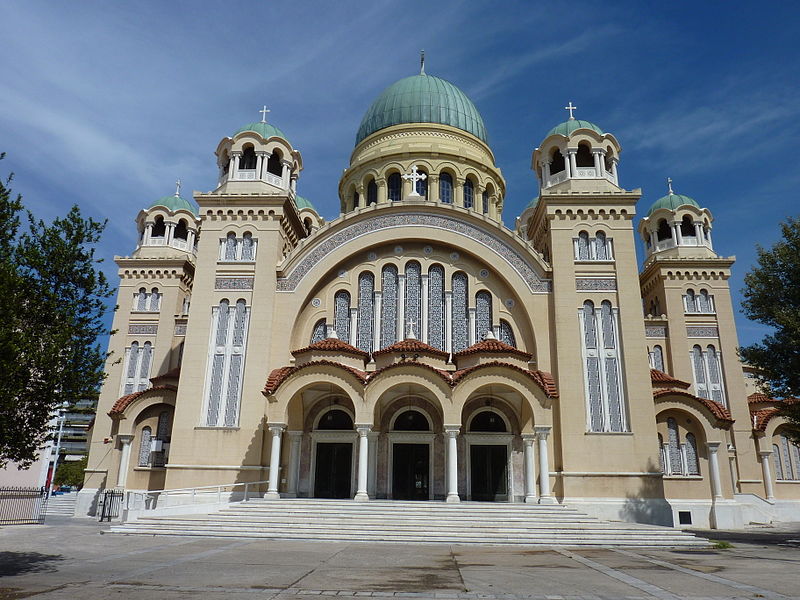
Religion in Greece, is dominated by the Church of Greece, which is part of the wider Greek Orthodox Church. It represents the majority of the population and Greek Orthodoxy is constitutionally recognised as the “prevailing religion” of Greece (making it one of the few European countries with a state religion). Other major religions include Catholicism, Hellenic Neopaganism, Judaism, Protestantism and Islam.
According to a 2010 Eurobarometer Poll, 79% of Greek citizens believe that there is a God, whereas 16% believed in some sort of spirit or life force and 4% responded that they did not believe there is any sort of God, spirit or life force. According to a more recent survey (April 2011) conducted by Kapa Research (a major Greek polling firm) at the request of To Vima newspaper, asking Greek citizens whether they believed in God or not, 56.3% answered “yes”, 20% answered “probably yes”, 7.7% answered “probably no” and 13% answered “no”.
Greek Orthodox Church. The Greek Orthodox Church, a member of the Eastern Orthodox Communion, is accorded the status of “prevailing religion” in Greece’s constitution, and Greece is the only country in the world where an Eastern Orthodox Church is clearly recognized as a state religion. Since 1850, Greek Orthodoxy within Greece is handled by the Church of Greece. Its members comprise between 45% and 98% of the population, although recent surveys on the religiosity of Greek citizens seem to contradict these numbers.
The status of the Orthodox church as the “prevailing religion” is largely based on the role the church played for the preservation of the Greek nation through the years of the Ottoman Empire but also for the role the church played in the Greek War of Independence. As a result, many[who?] attribute to the modern Greek nation an ethnoreligious identity, though granted not as strong as it exists say, in the Jewish nation.
The Church of Greece is largely exempt from taxes, compared to other religious organizations. Furthermore, the mainstream Orthodox clergy’s salaries and pensions are being paid for by the State at rates comparable to those of teachers. All Greek students in primary and secondary schools in Greece attend Christian Orthodox instruction, although there is an exemption system for students who do not want to attend, as long as the exemption is requested by both parents. In addition, the Constitution prohibits proselytism from other religions, but places no such restrictions on the Orthodox Church.
Roman Catholicism. Indigenous Catholic Greeks number approximately 50,000 and are found all over Greece, the majority however live in the Cyclades and the Ionian Islands. The presence of Catholics in the Greek islands is mostly a heritage from the time of the Venetian domination from the Middle Ages to 1797. The Roman Catholic community has increased in size in recent years due to immigration and today number over 200,000.
Greek Catholicism. Catholic Greeks of the Byzantine Rite (Uniates) number approximately 5,000 and mostly live in Athens.
Protestantism. Protestants, including Greek Evangelical Church and Free Evangelical Churches, stand at about 30,000. Free Apostolic Church of Pentecost Founded by Dr. Leonidas Feggos in 1965. The belief of the Greek Pentecostal Church is based upon the Bible. It is in agreement with the “Approved” Creed as determined by the two Ecumenical Church Councils. Previously the official church, Eastern Orthodox, and the State reluctantly gave permission for Pentecostal churches to operate legally. The process of receiving permission from the Ministry of Education and Religion to operate as a church is becoming easier. Assemblies of God, International Church of the Foursquare Gospel and other Pentecostal churches of the Greek Synod of Apostolic Church have 12,000 members. Independent Free Apostolic Church of Pentecost is the biggest Protestant denomination in Greece with 120 churches. There are not official statistics about Free Apostolic Church of Pentecost, but the Orthodox Church estimates the followers in 20,000.
Hellenic Polytheism. About 13,000 people are members of the Supreme Council of Ethnikoi Hellenes, the foremost organisation of Hellenism, the restoration of the traditional ethnic religion of the Greeks. 300,000 people are “sympathisers”.
Judaism. The Jewish community in Greece currently amounts to roughly 7,500 people, concentrated mainly in Athens, Thessaloniki, Larissa, Volos, Chalkis, Ioannina, Trikala and Corfu, while very few remain in Kavala and Rhodes. It is composed largely of two groups, the Romaniotes, Jewish communities dating back to Antiquity, and the Ladino-speaking Sephardim, who arrived from Spain and settled chiefly in Thessaloniki during Ottoman times.
Islam. Indigenous Turks and Muslims in Greece are mostly of Turkish origin though a community of Greek Muslims exists as well. The number of followers of Islam is estimated to be at 97,604 people or 0.95% of the total population, according to the 1991 census. Immigrant Muslims are estimated between 200,000 and 300,000.
Buddhism. The number of the followers is not so high amongst the Greeks but it has increased during the last decades because of the immigration of people from East Asia in Greece. Today there are three religious centers, in Athens, Thessaloniki and Corinth.
Other faiths. Other minor faiths in Greece include Jehovah’s Witnesses(who number about 30,000), Seventh-day Adventists, Mormons and Scientologists. Groups that constitute less than 1 percent of the population includes Baha’is.